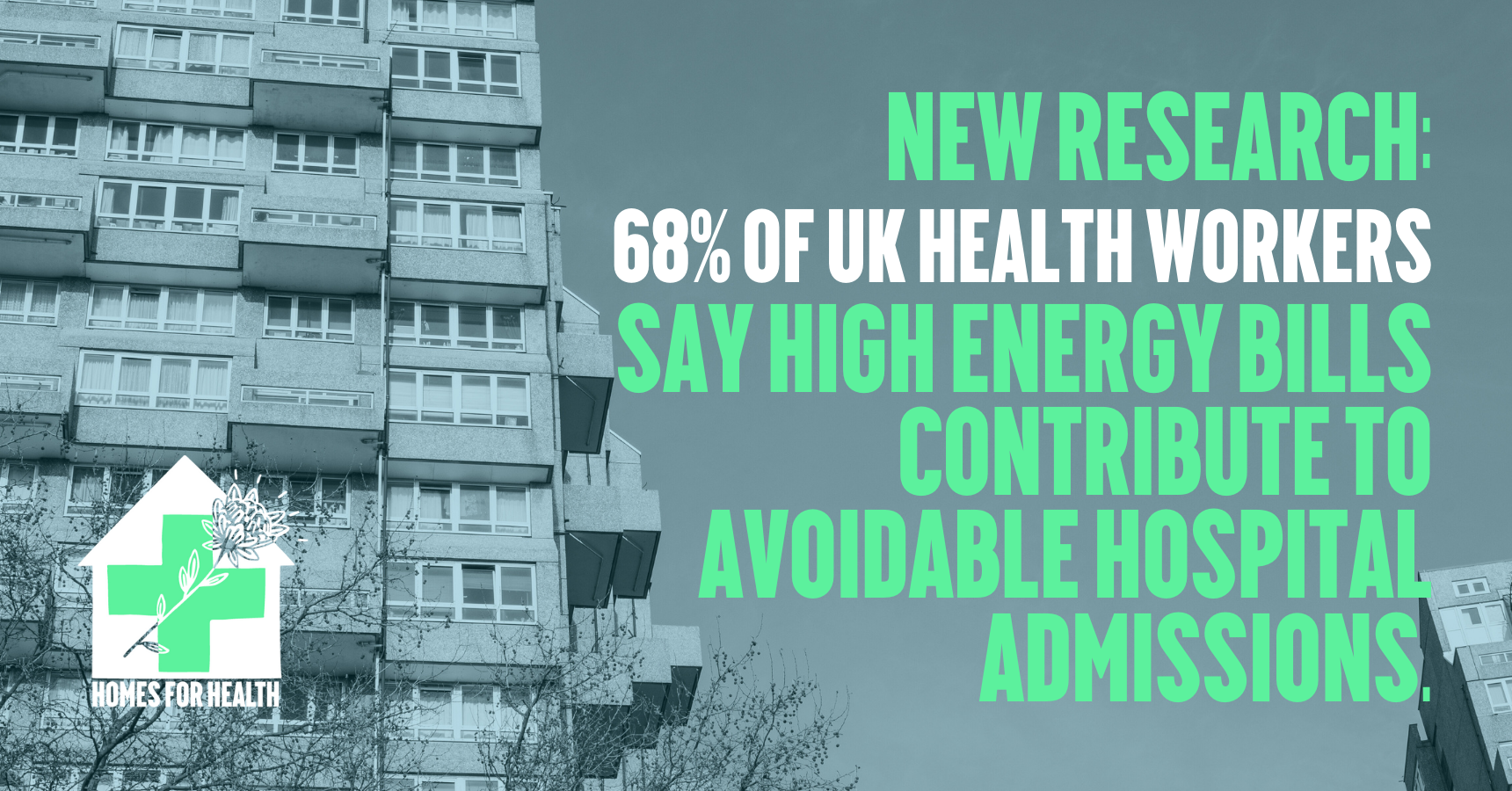
A new Medact study reveals the frontline account of the impact of cold homes and high energy bills on people’s health and the NHS, with shocking statistics about what health workers bear witness to. It shows that seven out of ten health workers regularly see patients forced to go without energy because they are unable to pay their bills – of these, nearly a third report witnessing this weekly, while one in ten see patients in this position almost every day
In partnership with the Warm This Winter UK campaign, we commissioned this nationally representative survey, polling 2,128 people who work in health in the UK. Among other key findings, it shows that two thirds of UK health workers say high energy bills contribute to avoidable hospital admissions. Forty-five per cent have sent patients home knowing that their housing situation would make them ill again.
This was covered today by Holly Bancroft in the Independent, who quoted our member Dr LJ Smith, a respiratory consultant working in London:
“Every single day I treat patients whose lung conditions are entirely preventable, but they tell me their homes are cold, mouldy and damp, and they just cannot afford to keep the heating on. As a healthcare worker I shouldn’t need a detailed knowledge of energy tariffs and benefits –I just want to get back to the job I was trained to do, working with my patients to help them thrive despite their lung condition. This is a public health crisis that is entirely preventable, with solutions that lie outside the NHS.”
Medact member Dr Amaran Uthayakumar-Cumarasamy also wrote about the figures in an opinion piece fo LBC, saying:
“Since its inception, the NHS was never meant to stand alone in its role supporting the health of the public. When Nye Bevan became a minister, it was a Minister for Health and Housing, such is the significance of the link between poor quality housing and illness. Urgent and transformative change is needed in the housing and energy sectors to ensure current and future generations of children and young people can reach their full potential.
We know all too well that cold homes are dangerous, causing avoidable harm to far too many people in our country. They are linked to a gamut of health impacts, including respiratory conditions, cardiovascular diseases, mental health issues, dementia, and hypothermia – and they significantly slow recovery from injury.
The survey data show that our NHS workers are without doubt seeing these impacts of the housing and fuel poverty crises on the ground. Almost three quarters believe poor-quality housing worsens chronic health conditions or delays treatment of them, and two thirds see children experiencing respiratory problems caused or worsened by mould or damp regularly (at least once a month).
We also know that the picture is only going to get worse: Ofgem recently announced that the energy price cap for April to June will increase by 6.4%, bringing the average annual energy bill to £1,849. Compared to winter 2020/21, this represents a 77% increase, or over £800 more per year per household.
Urgent action is needed – our hospitals can patch people up, but they can’t fix the underlying environmental causes. Our research brought to light that more than two thirds of UK health workers feel powerless to support my patients with their housing conditions, and over two thirds believe that government spending to prevent illnesses created by cold homes is better for the NHS than having to spend money to nurse patients back to health. Furthermore, over half rightly believe that addressing energy affordability and improving energy efficiency would reduce the impact of housing problems on the NHS.
Alongside the survey study, we interviewed health workers including Medact members about the crisis. Dr Sabrina Monteregge, clinical psychologist working in London told us:
“We can fund the NHS but if that’s not alongside funding healthy homes, we’re not going to get very far, because we are just constantly treating problems that the NHS is not built for. The NHS is on its knees, but it was never meant to stand alone – it must work alongside policies that support public health.”
This vast crisis is taking its toll on health workers as well – many also report their own mental or physical health has been impacted by housing issues. One in four believe that the health impacts of housing problems put plans to improve the NHS at risk.
Simon Francis, coordinator of the End Fuel Poverty Coalition, said:
“These shocking findings depict the front-line, public health crisis caused by high energy costs and poorly insulated homes. Expert reports have long made the link between living in cold damp homes and medical problems, but this research brings home the real-life situations that people are facing.
“We need bolder action from the government to address this crisis – that means all government departments working together to see fuel poverty as a national challenge. And it means the Chancellor backing moves to tackle the problem, such as committing the full £13.2bn funding needed for the Warm Homes Plan.”
Caroline Simpson, spokesperson for Warm This Winter, our partner on this study, said:
“It’s a disgrace that people across the country are forced to live in such unhealthy homes and are unable to afford to keep them warm and dry thanks to over a decade of neglect by the last government.
“Especially when we see energy companies raking billions in profits whilst ordinary people are choosing between eating and heating. That’s why we need to ramp up our renewable energy and insulation programmes and we know this government is on the right track with that. Only by doing that will we free billpayers from the high cost of energy so they can get the homes they deserve.”